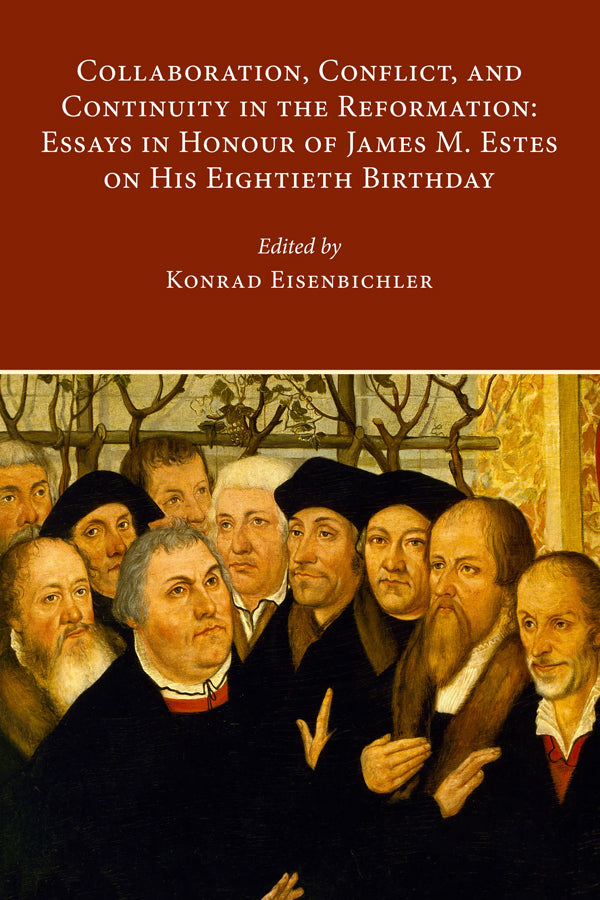Collaboration, Conflict, and Continuity in the Reformation. Essays in Honour of James M. Estes on His Eightieth Birthday
Edited by Konrad Eisenbichler - ES34
Overview
For several decades James M. Estes has been pointing to the complexity of the problems facing sixteenth-century reformers and the practical solutions they were able to reach. The career of Johannes Brenz, who successfully laid the foundations for a territorial Church in Württemberg, the careful analytical thinking of Philip Melanchthon, who sought (but failed) to reach an accord with the Catholic side, and the incessant correspondence of Desiderius Erasmus, the Prince of Humanists, who saw the liberal arts as the solution to this world’s problems, all serve as guideposts for Estes’ career as a scholar, but also for this collection of articles in his honour.
Konrad Eisenbichler is a past director of the Centre for Reformation and Renaissance Studies at the University of Toronto. He has published widely on the Italian Renaissance. His most recent monograph, The Sword and the Pen: Women, Politics, and Poetry in Sixteenth-Century Siena, won the 2013 Ennio Flaiano Prize for scholarship and was named “Outstanding Academic Title for 2013” by Choice.
431 pp.
ISBN: 978-0-7727-2174-7 softcover
Published: 2014
Contents
Introduction, Konrad Eisenbichler
Publications by James E. Estes
James M. Estes, Teacher and Scholar
1. “A Student’s Recollection,” Andrew Colin Gow
2. “James M. Estes and the Collected Works of Erasmus,” James McConica
Friendship and Collaboration
3. “Brenz and Melanchthon – Friends from Youth,” Heinz Sheible
4. “Face-to-Face Meetings between Philip Melanchthon and Johannes Brenz: Differentiated Consensus in the Reformation,” Timothy J. Wengert
5. “Erasmus of Rotterdam in Print: The Question of Reputation (1514-1521),” Valentina Sebastiani
6. “‘For What Has Erasmus to Do with Money?’ Desiderius Erasmus, a Paragonic Fund-Raiser,” Susan C. Karant-Nunn
7. “Wolfgang Capito and Erasmus: The Rapprochement of 1535,” Erika Rummel
Reforming the People and the Church
8. “Erasmian Reform and Education in the Dutchy of Jülich-Berg,” Nicole Kuropka
9. “The History of Johannes Brenz’s Territorial Church: An Overview of the Organization of the Württemberg Church,” Hermann Ehmer
10. “Reorganizing the Pastorate: Innovations and Challenges in the French Reformed Churches,” Raymond A. Mentzer
11. “The Label of Erasmus, the Doctrine of Luther,” Silvana Seidel Menchi
12. “Johann Herolt and Thomas Stapleton: Two Northern Influences on Preaching in the Diocese of Novara,” Thomas Deutscher
The Polemics of the Reformation
13. “Too Little, Too Late: The Erasmus-Luther Debate,” Scott H. Hendrix
14. “‘Things I Never Said or Thought’? Erasmus’ Exegetical Contribution to the Early Eucharistic Controversy,” Amy Nelson Burnett
15. “The ‘Three Kingdoms’ of Simon Musaeus: A Wittenberg Student Processes Luther’s Thought,” Robert Kolb
Catholic Opponents of Erasmus and Luther
16. “Erasmus’ Controversy with Agostino Steuco,” Charles E. Fantazzi
17. “Slow and Cautious: The Origins of Printed Polemics by Paris Theologians Against Luther and Lutheranism (1519-1523),” Mark Crane
18. “The Attitudes of the Jesuits Toward Erasmus,” Paul F. Grendler
The Search for Religious Peace
19. “Religion in the Religious Peace Agreements of the Early Modern Period: Comparative Case Studies,” Irene Dingel
Praise
“The high quality of this volume surely does honour to Jim Estes.” — R. Emmet McLaughlin, Villanova University
“The esteem in which Jim Estes’ scholarship is held is reflected in the simply stunning array of scholars assembled in this excellent volume. Their essays are uniformly first rate. This is a volume that not only honours Jim’s work, but coheres and educates.” — David Whitford, Baylor University
“The quality of this collection is remarkable. The editor has called together a list of outstanding contributors from both sides of the Atlantic. The thematic parameters marvellously evoke a series of diverse, yet complementary articles that shed new light on the establishment of the Reformation, the dissolution of religious consensus, the frequent and – thanks to this volume – surprising degree of dialogue across confessional lines, and the shifting networks of people whose convictions, quirks and personalities changed the face of the Western Christian tradition.” — Robert Bast, University of Tennessee
Reviews
Journal of Ecclesiastical History, (2016), pp. 172-173. Reviewed by Kenneth Austin.
Journal of Jesuit Studies, 3:1 (2016), pp. 99-101. Reviewed by Karin Maag.
Journal of Theological Studies (2016). Reviewed by Donald K. McKim.
Renaissance and Reformation, 38.3 (Summer 2015). Reviewed by Johannes C. Wolfhart.
The Catholic Historical Review, 102:3 (Summer 2016), pp. 612-613. Reviewed by Jarret A. Carty.
Couldn't load pickup availability


